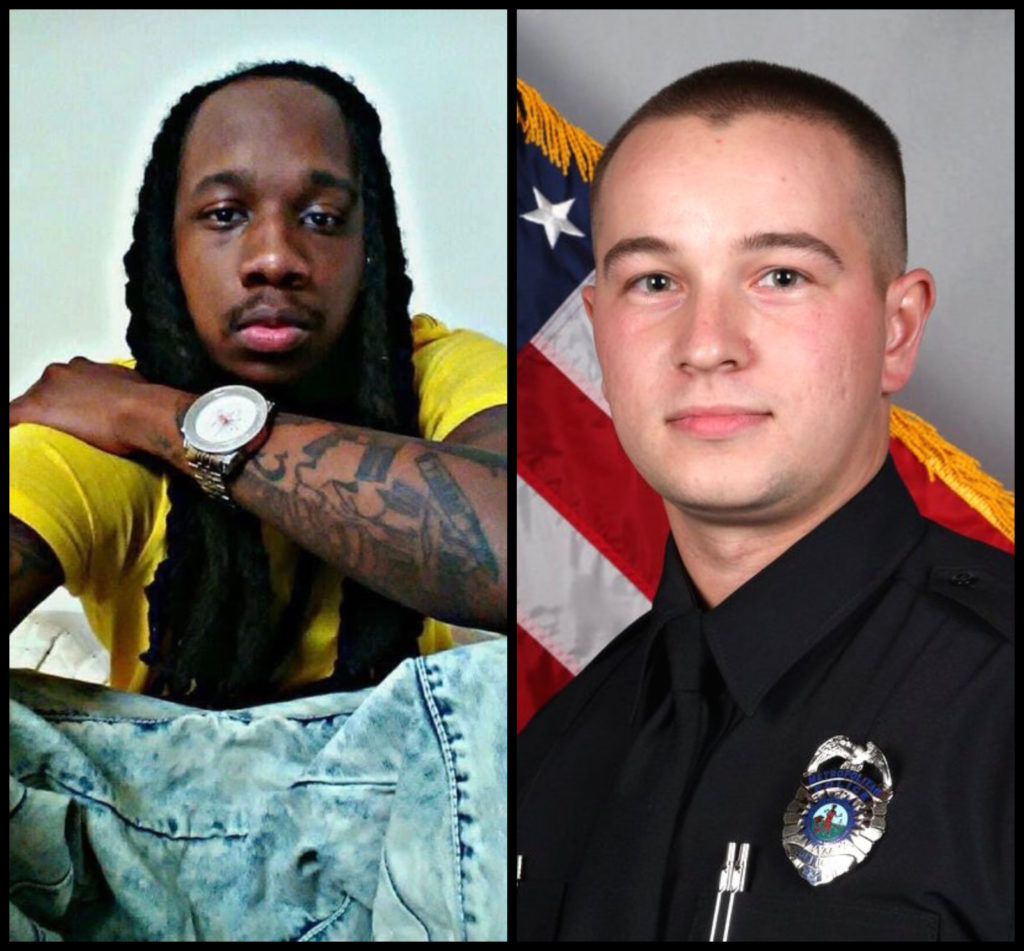
Jim Todd has been practicing law for more than a quarter of a century. And as a defense attorney who also spent more than a decade in the Nashville District Attorney’s office, he’s seen the legal system from both sides.
But next week, it won’t be an ordinary civilian going on trial. It’ll be a Nashville police officer, the first to be charged with murder for an on-duty killing.
Todd says it’s a very difficult case to break down.
“I think there’s several factors that have to be considered,” he says. “Obviously, first, that an officer by statute has a duty to protect, has a duty to arrest and has a duty to, for lack of a better term, chase somebody.”
So, Todd is saying that a police officer can’t just let someone run away if he thinks they’re breaking the law. And if an officer believes that the person running away could put anyone in immediate danger, he’s allowed to shoot.
 Courtesy Court TV via AP
Courtesy Court TV via AP Former Minneapolis police officer Derek Chauvin was convicted on three counts of murder and manslaughter in April for killing George Floyd.
“Those laws are going to have to be explained to the jury and then the state will have the burden of proving beyond a reasonable doubt that those laws don’t apply.”
Tennessee’s homicide laws are different than those in other states where police officers have gone on trial. In Minnesota, for instance, Officer Derek Chauvin was charged and convicted of three offenses, ranging from second-degree murder to manslaughter. Delke, on the other hand, faces just one charge: first-degree murder. I asked Todd if it would be possible for a jury to convict Delke on a lesser homicide charge.
“Not only is it possible, but it’s the law,” he says. “The jury will have to be instructed of numerous, lesser, included offenses.”
Todd says they’ll start at the top with first-degree murder. But if they don’t think it was premeditated, then they’ll have to go down a charge, to second-degree. And they’ll keep going through that cycle until they find a charge that fits. Or else, they have to find him not guilty.
“Juries sometimes look at these as a menu and they look at them together. They’re told not to. They’re told to go in order,” Todd says.
“So, in essence, for Officer Delke to walk away without any conviction, he has to win at least on five separate counts of homicide.”
 George Walker IV Pool/The Tennessean
George Walker IV Pool/The TennesseanAssistant District Attorney Roger Moore and District Attorney Glenn Funk talk during a preliminary hearing for Metro Police Officer Andrew Delke in 2019.
I asked Todd how he thought prosecutors would try to convince jurors that Delke should be found guilty.
“I don’t know what the prosecution’s argument is. If I had to guess, my guess would be that they are going to argue two things: One, that Officer Delke did not have probable cause to believe that Mr. Hambrick had committed a felony.”
Todd points out that Delke didn’t know who Daniel Hambrick was. When the officer decided to chase, he didn’t know about Hambrick’s criminal record or whether he had any warrants out for his arrest. Plus, Todd says there’s no evidence that shows Hambrick pointed a gun at the officer.
More: Learn more about the case in our podcast, Deadly Force
“And then secondly, I think they’re going to focus a lot on the way Officer Delke positioned himself and fired his gun. And the fact that he steadied it, steadied himself, got down, pointed his weapon, goes to premeditation.”
So, that’s the prosecution side. I also asked Todd what he thought the chances are that the defense could prove that Delke shouldn’t be convicted.
 Shalina Chatlani WPLN News
Shalina Chatlani WPLN NewsDefense attorney David Raybin says Officer Andrew Delke was following his training when he shot Daniel Hambrick during a foot pursuit in July, 2018.
“It’s a very, very factually distinct case,” he says. “So, the first thing is that the defense has to establish that Officer Delke had probable cause to believe that Mr. Hambrick was committing a felony either being in a stolen car or when he pulled his handgun. I believe Officer Delke will testify that Mr. Hambrick pointed it at him, which is aggravated assault, which is a felony.”
That means if Hambrick really did commit a felony, then Delke had a duty to try to arrest him, Todd says.
But it’s not just that. Todd says the jury will also have to consider whether a person running away from police with a handgun poses an imminent danger — either to the officer or to the general public.
Delke says he was afraid for his own life because Hambrick supposedly pointed a gun at him. But Todd says Delke also had to think about the backup officers who were on their way.
“And then thirdly, Officer Delke was headed towards a school. And so, an officer in two to three seconds has to make a decision. And Officer Delke made his decision and the jury will determine whether that’s a crime or whether he was doing his job.”
Todd says video is the wild card. This week, Judge Monte Watkins ruled that the jury will be allowed to see footage of the shooting, and he says that could play on jurors’ emotions.
“You see a person being killed and that’s hard to overcome,” he says. “Whether the jury believes that what you see in the video is enough for Officer Delke to pull and discharge his firearm is a question the jury will have to answer.”
You can learn about recent efforts for police reform in Nashville on episode four of Deadly Force Thursday night at 6:30 on 90.3 or the WPLN app. You can also follow the podcast by visiting wpln.org/deadlyforce or through your favorite podcasting app.
 This story was produced as part of APM Reports’ public media accountability initiative, which supports investigative reporting at local media outlets around the country. Support also came from the Corporation for Public Broadcasting.
This story was produced as part of APM Reports’ public media accountability initiative, which supports investigative reporting at local media outlets around the country. Support also came from the Corporation for Public Broadcasting.


